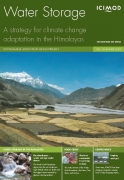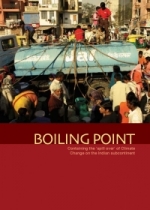Political
Climate change impacts in drought and flood-affected Areas: Case studies in India - A report by the World Bank
Posted on 11 Apr, 2010 03:50 PMThis report by the World Bank discusses the climate changes in India and the disasters associated with these climate changes such as floods and droughts and their negative impact on agriculture, food production, livelihoods, security and the condition of the vulnerable groups in the country. The report goes on to discuss the policies undertaken by the Government of India to deal and adapt with these changes and the challenges faced in implementing these policies.
Water Storage: A strategy for climate change adaptation in the Himalayas - A report by ICIMOD
Posted on 10 Apr, 2010 05:24 PM This report by the International Centre for Integrated Mountain Development (ICIMOD) highlights the phenomenon of climate change and argues that water storage will be a key strategy for climate change adaptation in the coming years.
This report by the International Centre for Integrated Mountain Development (ICIMOD) highlights the phenomenon of climate change and argues that water storage will be a key strategy for climate change adaptation in the coming years.
The report discusses the importance of the Hindu Kush Himalayan ranges as an important source of water to a large section of the population and warns of the impending crisis of water scarcity and food insecurity in the regions of Asia, if water harvesting and conservation efforts are not undertaken. The document argues that water storage thus becomes a central issue, which is very complicated to implement, particularly in the Hindu Kush Himalayan region.
Joint Convergence Guidelines of the National Rural Employment Guarantee Act and Integrated Watershed Management Programme, issued by the Ministry of Rural Development (April 2009)
Posted on 09 Apr, 2010 09:36 PMThe Joint Convergence Guidelines issued by the Ministry of Rural Development (MoRD) in April 2009, attempts to bring about inter-sectoral convergence in the various watershed management programmes being implemented by the different departments under the MoRD. In particular, it deals with the convergence between the National Rural Employment Guarantee Act (NREGA) being implemented by the Department of Rural Development (DoRD) and the Integrated Watershed Management Programme (IWMP) being implemented by the Department of Land Resources (DoLR).
Jal Chetna Yatra Report by Institute of Rural Research and Development (IRRAD)
Posted on 09 Apr, 2010 03:26 PMInstitute of Rural Research and Development (IRRAD) organised "Jal Chetna Yatra" where three groups started the yatra from three different blocks of Mewat on 19th March, sensitizing the community towards water issues and collect at the district headquarters on 22nd March, World Water Day.
Click on the attachment to read the entire report.
The Community Engineer - Knowledge Transfer/ Training
Posted on 09 Apr, 2010 12:08 PMWe are a group of engineers driven by a common aim of empowering engineers and technicians at grass root levels through training and knowledge transfer. We have for this purpose decided to manage a webpage to reach out to the professionals at municipality and panchayath level. The path is as follows.
Best practices for water management at a household and residential layout-level in Bangalore - A note by Biome
Posted on 09 Apr, 2010 02:07 AMThese two documents enlist best practices in urban water management, based on the experiences of Biome Solutions, and are relevant for households in a gated layout/group housing complex, where the water sourcing, supply and management is in the hands of the layout and there is no connection to the the local water supply authority.
Calculating production cost of water in an urban residential layout setting - A spreadsheet-based toolkit by Biome
Posted on 08 Apr, 2010 10:47 PMBased on the annual costs of imported (purchased) water, pumping (energy), water supply infrastructure and borewell maintenance, wastewater treatment, human resources, rainwater harvesting maintenance, sinking fund (cost of replacement of infrastructure), this spreadsheet-based toolkit by Biome Solutions, helps calculate the total cost (in Rs/KL) of water.
An ecological framework for water management in a domestic context - A spreadsheet-based toolkit by Biome
Posted on 08 Apr, 2010 10:43 PMBased on user-entered data on domestic water demand, waste water discharge, rainfall availability and recharge, extent of reuse of treated waste water, this spreadsheet-based toolkit developed by Biome Solutions allows you to juggle around with the relevant data fields, and figure out various ways in which you can bring down your overall groundwater draft (and hence ecological footprint) as low as possible, and gives a snapshot result of your overall household-level water input and output situation.
Boiling Point: Containing the spill over of climate change in the Indian subcontinent - A report by Sustainable Environment and Ecological Development Society (SEEDS)
Posted on 08 Apr, 2010 02:07 PM The report ‘Boiling Point’ by Sustainable Environment and Ecological Development Society (SEEDS) discusses the impact of climatic changes at the global, national and local level on the environment and on the current survival, food, water security issues and livelihoods of communities in India.
The report ‘Boiling Point’ by Sustainable Environment and Ecological Development Society (SEEDS) discusses the impact of climatic changes at the global, national and local level on the environment and on the current survival, food, water security issues and livelihoods of communities in India.
The report highlights the problems faced by a number of communities from the different parts of the country by presenting case studies that describe how climatic changes have influenced local livelihoods and survival needs of communities with the marginalised and the deprived being the most affected. The report presents a few case studies that illustrate how people have coped with these problems by finding out appropriate, locally relevant and sustainable solutions.
The report recognises that identification of positive efforts made by individuals or groups of people through the case studies can be one such step towards triggering a discussion and educating the people on the seriousness of the situation and making them realise of the urgency to act fast. The report identifies the need for advocacy and educational efforts based on the bottom up approach involving the grassroot level that can lead to building up of pressure for the need to bring about changes at the policy level.